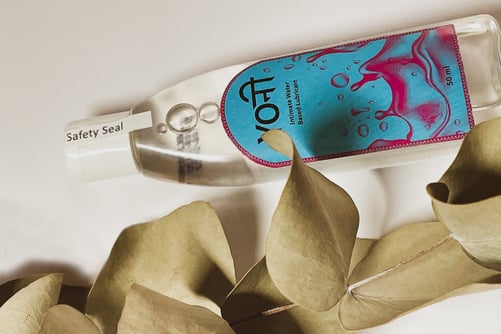Personal lubricants can be used during masturbation or partner sex. They are typically used to make penetration more comfortable or to ease pain caused by vaginal dryness. There are many myths about using lubricant during sex, the most common being that if you need lubricant, you are not attracted to your partner. This is not true. In a study by Indiana University, 70% of the over 2000 women surveyed said that lube made sex more pleasurable and enjoyable.
So if you find yourself looking for lube, there is no reason to feel ashamed; however, there are some things you should know when picking your first bottle. We are going to take a look at the different kinds of lubricants on the market and each of their pros and cons.
Common Types of Lube
There are many different types of lubes on the market today, each with its benefits and drawbacks. When you search for the perfect lube, it is essential to read the ingredients to avoid common problems with each kind.
The most common types of lubricants are water-based lubricants, silicone-based lubricants, and oil-based lubricants.
It is also important to note that some lubricants contain a combination of water and oil or water and silicone or other ingredients. That is why it is always important to read the ingredients to ensure you have chosen the right lube for your needs.
Many natural products can be used as lubricants. Some of these include mineral oil, coconut oil, or saliva. Mineral oil is not skin-safe and is not recommended as a personal lubricant. Coconut oil is safe to use as a personal lubricant; however, it can degrade materials such as latex and silicone. For that reason, it is important to consider the fact that they may cause damage to latex condoms, latex diaphragms, and silicon or latex sex toys. Because of this, we advise to instead stick with water-based lubes.
Some products are marketed as natural personal lubricants. Although they are marketed as all-natural, they can cause irritation. As well, most of these lubes are sticky and dry out quickly. Because of this, we recommend avoiding them.
Water-based Lubricants
There is little that can go wrong with water-based lubricants. Water-based lubricants effectively reduce friction and increase glide. They are safe with silicone and latex, making them appropriate for use with silicone sex toys and latex condoms or diaphragms. Water-based lubes are easy to clean off the skin and other surfaces, so you don’t have to worry about staining your sheets or other spots where you have sex. There are a few downfalls when it comes to water-based lubricants, but like anything thing in life, nothing’s perfect.
One common complaint about water-based lubricant is that it can become sticky fairly quickly (the quality of your water-based lube makes a difference with this issue), so if you’re planning on having a marathon sex session, you will need to reapply the lubricant pretty often. The main problem with a water-based lubricant is that it won’t work if you have sex in the shower or the bath because the water will dissolve the lubricant away. Other than issues with shower sex, a water-based lubricant is an excellent option for anyone looking for a little less friction in their life.
Water-based lubricant is an all-around great lubricant, especially if you are trying lubricant for the first time.

We recommend Water-based Personal Lubricant: Yoni Lubricant by Yoni for anyone looking for a great water-based personal lubricant that is scent-free and works great.
Silicone-based Lubricants
Silicone-based lubricants are another common type of personal lubricant. If you’ve ever used a silicone sex toy, you know that silicon is a smooth material that does a great job of reducing friction and creating a natural feeling of glide. Silicon lubricant is similar. It has more downfalls than water-based lubricant but can be a good option when used correctly.
A silicone-based lubricant is excellent for sex in the shower or bath because the water will not wash your lube away. It also needs less frequent re-application, so it is better for extended sex sessions. While silicone-based lubricant is safe for latex condoms and diaphragms, it is not safe for silicone sex toys or other silicone products. It can break down the silicone on the sex toy resulting in cracks that can house bacteria.
They can also stain your sheets and other areas. A silicone-based lubricant is also harder to clean off the skin: instead of just being able to wipe clean once you’re done, you’ll need to wash with soap and water to remove the lubricant. While there may be a time or place for silicone-based lubricants, they are much less versatile than water-based lubricants.
Oil-based Lubricants
Oil-based lubricants are our last type of personal lubricant. They are also less versatile than water-based options, but there may be a time and place for them, depending on your preferences.
Like silicone-based lubricants, oil-based lubricants last longer without re-application, so if you are planning a long sex session and prefer not to have to re-apply lubricant, oil-based lubricant might be a good option. They will also work during shower sex because they won’t be washed away in the water.
People who use oil-based lubricants enjoy them as massaging oil during foreplay and personal lubricants. However, oil-based lubricants are unsafe for latex condoms or other latex products. The oil in the lubricant breaks down the latex and causes the condom or other latex products to break. This effect has also been seen with non-latex condoms.
Oil-based lubricants are also hard to clean from your body, your sheets, and other surfaces. It is common for it to stain sheets and other surfaces. Finally, some studies have found that using oil-based lubricants can lead to more frequent vaginal infections. If you decide to use an oil-based lubricant, ensure you are prepared and know what is safe to use with them and what is not.
Parting Thoughts
No lubricant works for everyone; we each have our preferences, which is okay. The most important thing is to know which ingredients are compatible with which materials so you don’t damage anything. While water-based lubricants are more versatile, silicone-based and oil-based lubricants also serve a purpose. When in doubt, it is always best to choose a water-based lubricant as it is compatible with most materials and is the least likely to create problems.


